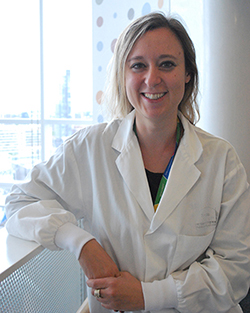Stopping cancer in its tracks - sarcoma research fund to look at new treatments and limiting metastasis
It was one year ago this week that François Angers publicly announced his fight against the cancer that claimed the life of his twin sister Nicole Angers Legault. In partnership with the Montreal General Hospital (MGH) Foundation of the McGill University Health Centre (MUHC) he established a $4 million research fund to find treatments and cures for sarcoma—a rare, but deadly cancer.
Sarcoma, which is what Terry Fox was diagnosed with when he was only 18 years old, is a form of cancer that targets connective tissues, such as muscle, bones, nerves, fat and blood vessels, and affects people of all ages. It was this diagnosis that prompted him to start his cross-country Marathon of Hope for cancer awareness and fundraising. Although he lost his battle with this cancer at the age of 22, his legacy persists. This past Sunday marked the 36th anniversary of the Terry Fox Run.
This new MGH Foundation-MUHC fund will work toward developing a better understanding of sarcoma, why and how it spreads, as well as ways to improve patient care and treatment. It will also support basic research within the only provincially designated supraregional sarcoma program in Quebec, which provides sarcoma patients across the province with the complex care that they need.

“We’ve come far since Terry Fox’s day but we still have a long way to go. I hope the Nicole and François Angers Sarcoma Research Fund team, with Livia at the helm, will help get us there,” says Dr. Robert Turcotte, the medical director of the MUHC's sarcoma program and a world recognized leader in the field of the orthopedic oncology and sarcoma research.
“The research will be led by Dr. Livia Garzia,” says Dr. Robert Turcotte, the medical director of the MUHC's sarcoma program and a world recognized leader in the field of the orthopedic oncology and sarcoma research. “She has a doctorate in life sciences from the Open University in Cambridge, United Kingdom and since 2008, Livia has been with SickKids in Toronto. Her research has focused on the mechanisms of cancer metastasis and resistance to therapy.”
According to Dr. Livia Garzia, sarcoma is one cancer where the primary disease is well treated, with an over 80 per cent success of getting rid of the local cancer. “However, we have not made much progress in preventing or curing sarcoma that spread into metastases.
“The majority of deaths in patients initially diagnosed with sarcoma are due to the spread of tumour cells from the primary site,” says Dr. Garzia. “When they colonize in other tissue they become resistant to therapy, and we do not have any efficient therapeutic intervention against them at this time.”

Livia Garzia
Dr. Garzia and a team of researchers will study how sarcoma cells are driven out from the primary tumour to circulate and survive elsewhere in the body, and what makes them so aggressive that they become resistant to chemotherapy. “We want to figure out what the factors are that eventually causes sarcoma to resist therapy, and how these cells escape the primary site and metastasize to an organ,” she says. “Eventually we will be able to formulate new hypotheses and new types of targeted therapies.”
Dr. Livia Garzia will start her new mandate at the MUHC in January 2017. When asked about moving to Montreal, she says “I am Italian and so I am looking forward to moving to a more European-like city. I’m also learning French, which is very exciting for me. I love that Montreal will be my new home.”
“Through the leadership of donors like Francois Angers, we are proud to support the only provincially designated supraregional sarcoma program in Quebec,” says Jean-Guy Gourdeau, president of the Montreal General Hospital Foundation. “The Montreal General Hospital is a leader in surgical oncology programs and provides research funds to gain insights and achieve innovation to help us understand and cure these cancers.”